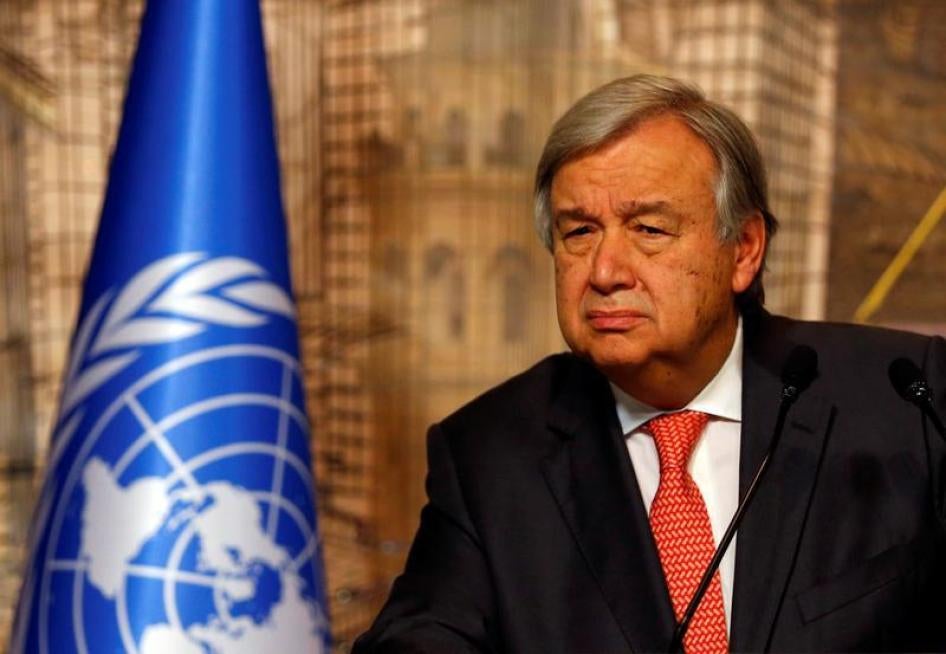When former Portuguese Prime Minister Antonio Guterres was elected United Nations secretary-general in 2016, many human rights activists welcomed the announcement. They hoped he would bring to UN headquarters the same passion for defending human rights that he showed during 10 years as the UN high commissioner for refugees.
But Guterres has been virtually silent on even the most egregious rights violations. Whether it was the Saudi government murdering the journalist Jamal Khashoggi, the Trump administration separating migrant children from their parents, or Russian-Syrian forces bombing Syrian hospitals, Guterres has steered clear of pointed criticism of those responsible. He speaks almost invariably in broad generalities.
It’s time to ditch this approach. It has only emboldened the world’s autocrats. Guterres should remind abusive states that the UN is not just a tool to promote economic development or a forum to talk about security, but a guardian of human rights. The UN has to work with member states but it needs to set clear red lines – publicly and privately – when governments bomb civilians or jail, torture and murder their critics. Guterres should make clear he is ready and willing to call out individual governments and their leaders.
Guterres inherited a difficult situation. Days after Donald Trump took office following his surprise victory, the media reported on a draft executive order to dramatically cut UN funding. This would severely hamper its ability to deliver humanitarian aid, vaccinate children, and protect civilians in war zones.
Thankfully that executive order never saw the light of day. The Trump administration has continued to target UN programs it dislikes, but Congress has neutralized its attempts to gut UN funding.
Yet Guterres continues to walk on eggshells around the US and other major powers. For example, he has been unwilling to publicly condemn China’s mass detention of one million Turkic Muslims in “political education” camps while praising Beijing’s rights-free “Belt and Road Initiative.” The victims of this mass arbitrary detention have reason to feel abandoned by the UN chief, as do victims of severe repression elsewhere.
Guterres has also disowned his office’s power to conduct fact-finding into serious abuses. Whether it’s the murder of two UN investigators in the Democratic Republic of Congo, the use of chemical weapons in Syria, or Khashoggi’s murder, Guterres and his team seem readily equipped with arguments to justify further inaction.
Guterres doubtlessly believes this is the best way to protect the UN at a difficult time. But relinquishing his authority is no answer. UN officials insist that Guterres discusses human rights behind closed doors. Private conversations could work if he could show that something of importance would be on the line if the government didn’t change its ways, but the UN secretary-general lacks the leverage governments possess, such as targeted sanctions. His only real leverage is the voice he declines to use in public. As a result, abusive governments in Syria, Saudi Arabia, or China pay no reputational price from his non-existent condemnation.
Guterres should use his term’s remaining two and a half years to exercise fully his authority under the UN Charter. He should authorize fact-finding missions to shed light on responsibility for serious abuse. And he should bring urgent issues to the Security Council’s attention. He did that only once—when the Myanmar army was ethnically cleansing Rohingya Muslims —but he did little to follow up. Such agenda setting should be part of his tool kit.
Most crucially, he should speak out whenever issues are of sufficient importance that his voice would add significant weight to the UN human rights commissioner’s. He should recognize that generic statements do no good because no one feels the heat to change. Rather, he should boldly and explicitly criticize member states for abusive actions.
Guterres need not abandon quiet diplomacy, but private conversations would be more persuasive if governments recognized that they could be followed by pointed public criticisms. A more outspoken approach undoubtedly will rankle some states, but it will help restore the credibility of the secretary-general as a world leader willing to fulfill his responsibility to defend people at greatest risk of abuse.









